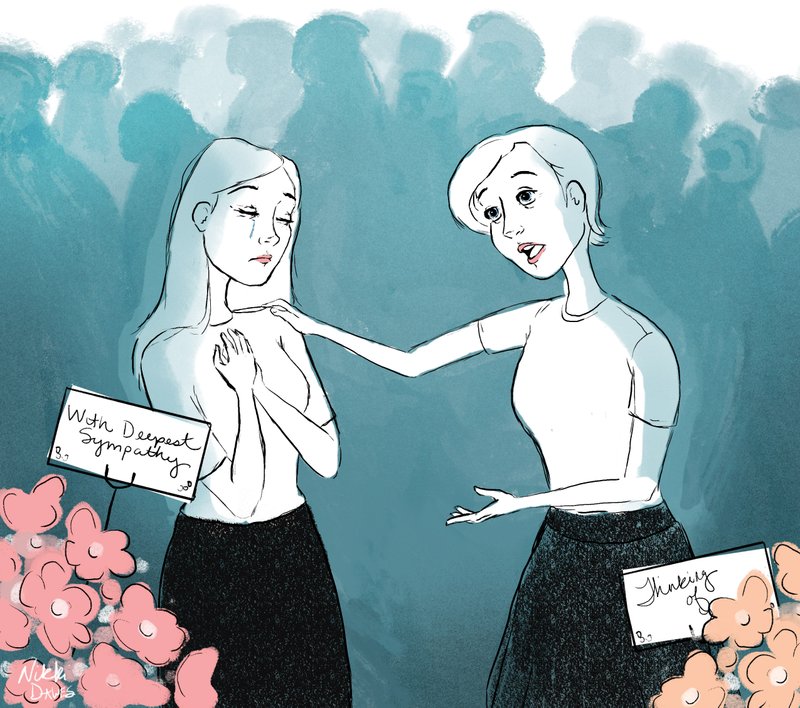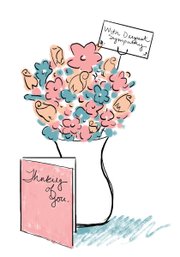Facing a death, and the subsequent funeral, people cope in different ways. Some stay strong in the midst of chaos. Others shut down and go within.
Then there are people who say, no matter how close they were to the person who died: "I don't do funerals."
"People feel good about bringing food, but it's hard beyond that," says Kristin Addison-Brown, a neuropsychologist in private practice in Jonesboro and public education campaign coordinator for the Arkansas Psychological Association.
"Funerals can help one move forward; for some it makes things more difficult," says Dawn Doray, a psychologist in private practice in Little Rock.
Most people "do" funerals, though.
"Participating in a funeral generally is a really good thing for the grief process," said David Feldman, an associate professor of counseling psychology at Santa Clara University in California and co-author of Supersurvivors: The Surprising Link Between Suffering and Success (HarperWave). "It's a place to express and receive social support, connect with other people, and it helps give people a sense of closure."
But it's hard to find support from people who won't participate. Ken Druck, author of Healing Your Life After the Loss of a Loved One (Wisdom of the World), said Americans have created a culture that is "grief illiterate."
"We are taught that there's a pill for every pain, for every problem, or a diversion for every moment of emptiness," said Druck, whose daughter died in 1996 when she was 21. "If there's one thing that evokes a feeling of helplessness, of all the things in life, it's death. It's much easier to turn away from, rather than face, life's most difficult challenges."
Advice columns are filled with examples of seemingly callous behavior that aggravates those in mourning and can leave long-lasting ill will.
"There is no one correct way to grieve," Doray says. "Some may be very emotional about it, others may be very stoic, others may avoid it altogether. Each of these responses often have nothing to do with the person who died. It's how people respond to death and how they mourn."
But understanding why people behave badly or don't show up at all can help.
• No-shows: Not everyone who stays home is callous and insensitive.
"It's not a statement about the person that died" or about anyone else, Doray says. The no-show "can't manage the grief. It's more about them than the one who died or the others."
Besides, Doray says, "it's great they didn't show, because you might have had to be dealing with that."
Feldman says unresolved conflicts contribute to the absence of some people.
"Often a funeral can awaken in people thoughts about their own lives, their own decisions, thoughts about how they interacted with the person who died," he said. "This can be profoundly good because it can encourage appropriate grief, but when there are significant regrets and significant guilt ... this can cause emotional turmoil and problems. It's important to respect those who are in this place and try to realize that they are disengaging because they can't face their emotions."
Doray says, "It's about where they are." No other person can change that. "You can't change that relationship. There is no way to resolve this with the other person; they have to come into it on their own."
• Grief groupies: "There are people who, for the wrong reasons, come out of the woodwork who over-represent the relationship with the deceased as more intimate and more loving than it was," Druck said. "It's the rubbernecking version of grief and loss. These are manipulative narcissists who are shameless and who will distort the reality of the situation."
Druck's advice? Let it go.
"If that's the story they need to tell themselves and in some way it redeems them in their minds of what they did or didn't do, they can go ahead," he said. "There's no real benefit to confronting someone like this.
"Some conflicts give you no return on your investments."
"Just don't take on their drama, their emotions," Doray says.
• Strangers: People unfamiliar to family and friends attend for other reasons.
The deceased might have had an impact on another's life that family and friends may not know about -- an act of kindness or a personal gesture that was very meaningful.
"Coming to the funeral is a way they can honor that person, show their respect," Doray says.
"People do attend funerals of those they don't know that well ... maybe that's how they manage something from their past."
• Complicated grievers: Feldman said some people experience what he describes as complicated grief, a process that is either more prolonged or more difficult than average due to emotional trauma. It might be best to encourage this person to see a professional counselor.
"They're not only feeling the loss of their loved one, but also are feeling frightened, scared for themselves," Feldman said. "For those people, funerals are less emotionally satisfying and may cause problems in the grief process."
Doray says complicated grief "usually is the result of a traumatic or unexpected death or a child's death. It's much like post-traumatic stress disorder. If there's an inability to heal from the trauma, that is when it's important for therapeutic intervention such as support groups or individual or family therapy."
• Part-timers: Druck says not to take it personally if someone doesn't attend all of the planned gatherings.
"Funerals can last anywhere from 15 minutes to three hours," Druck says. "With jobs and kids, people can't be expected to do the entire schedule of the church, cemetery, reception. If someone makes a genuine, well-timed appearance, even if it's for a little while, it makes the same statement: It says, 'Our family is keeping your family in our hearts and we wanted to be represented to let you know that.'"
IT'S ALL ABOUT SUPPORT
Doray says families often feel "they have to have a 'happy face' to others around them rather than saying, 'This is very difficult;I don't know if I can speak with you right now.' If they do say that, we need to give that person space.
"A lot of people don't know what to say to make someone feel better. Most of us want to express our sympathy, our support and move on. Most of us don't want to sit in that grief."
Still, she says, family members of the deceased "need to know someone is there for them."
That also is important in the days and weeks after the funeral, Doray says.
"Grief is longer than two weeks, there is no time limit," she says. "The thing I hear from families is that most people disappear after a few days. Just check in every so often, by phone or in person, and ask, 'How are you doing? How are you?' That kind of offering can mean a lot.
"Everyone grieves in their own way. If, after a month to six weeks, it's still difficult, they may want to meet with someone to help process this death. If it's interfering with sleep, work, the ability to interact with others, that's the time to seek help."
Ellis Widner contributed information to this report.
Family on 03/25/2015

